Weight management with
Hafnia alvei HA4597®
Mechanism of Action Molecular Mimicry of a Satiety Hormone (a-MSH) by Bacterial Protein
1. Molecular mimicry:
the role of ClpB in appetite regulation
ClpB pharmacophore with a-MSH molecular mimicry
TargEDys founders, Professors Déchelotte and Fetissov studied and described different metabolic pathways involved in appetite regulation through the microbiome-gut-brain axis. They focused especially on the satiety hormone alpha-MSH and its antigens.
As part of their research, they identified a microbiota-produced metabolite involved in the regulation of appetite: Caseinolytic peptidase B (ClpB).
This bacterial protein presents a similarity of sequence and structure to the satiety hormone alpha-MSH.
ClpB is able to connect to alpha-MSH receptors, activating the a-MSH pathways of satiety: this is molecular mimicry.
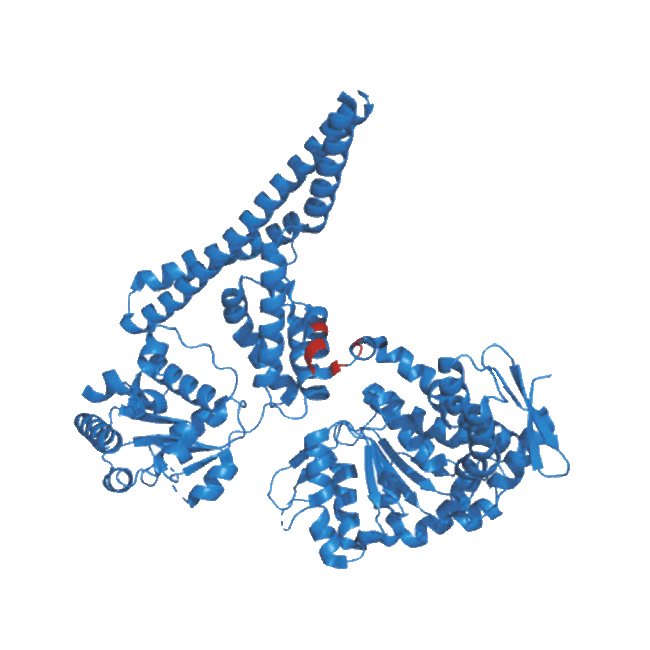
2. ClpB mechanism of action
ClpB is able to bind to alpha-MSH receptors on the enteroendocrine cells, activating satiety pathways locally and centrally and leading to an increased feeling of fullness.
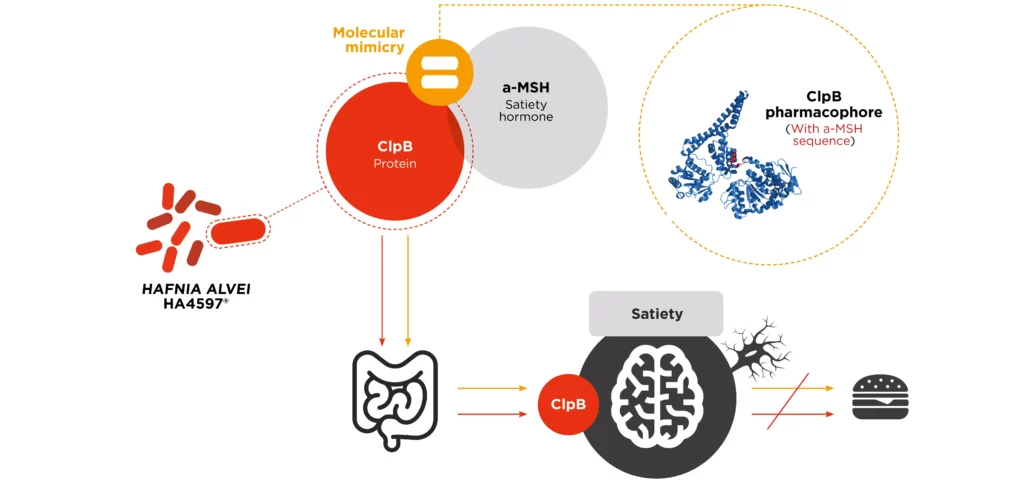
3. The strain Hafnia alvei HA4597® produces ClpB
The PreciBiomic strain Hafnia alvei HA4597® is a bacterium isolated from raw milk cheese which presents the particularity to express caseinolytic peptidase B (ClpB).
Hafnia alvei was first identified in 1954 in raw milk, and has since been found in traditional French cheeses with strong flavors such as Camembert and Livarot. Dairy product contamination during the 1990s led the cheese industry to pasteurise milk, which meant losing the typical aromas appreciated by cheese lovers. Hafnia alvei is now added to some pasteurized cheeses as a lactic ferment to restore their original flavor.
Hafnia alvei is metabolically active in the colon. Its genome has been fully sequenced and it does not have plasmids with antibiotic resistance genes nor virulence factors.
The ability of this strain Hafnia alvei HA4597® to produce ClpB makes TargEDys’ solution a unique precision probiotic in the field of weight loss.
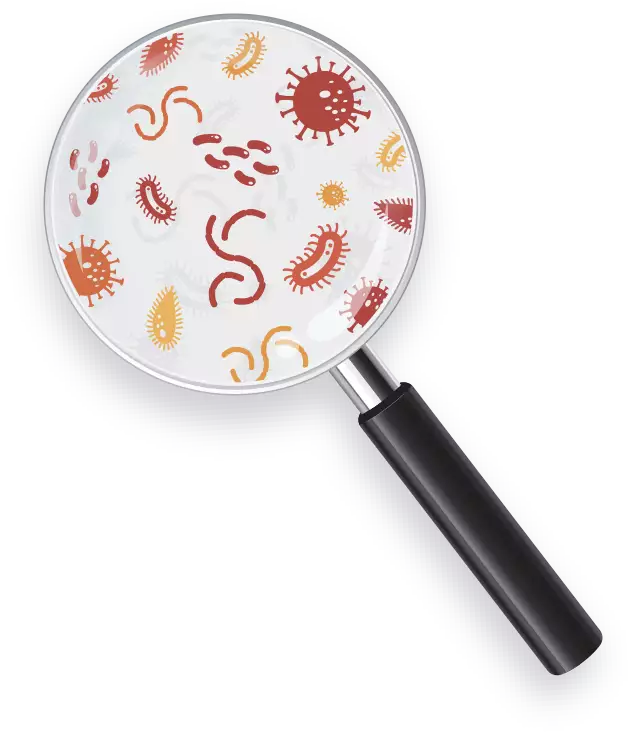
Scientific evidence From pre-clinical to clinical
1. Pre-clinical evidence
To validate the efficacy of Hafnia alvei’ s ClpB in appetite regulation and weight loss, TargEDys conducted preclinical studies with the Inserm laboratory of the University Hospital of Rouen (Normandy).

Legrand R. et al. International Journal of
Obesity (2020)
Hafnia alvei HA4597 increases fecal and plasmatic ClpB levels compared to placebo in Ob/Ob hyperphagic and high-fat diet mice – two models of obesity.
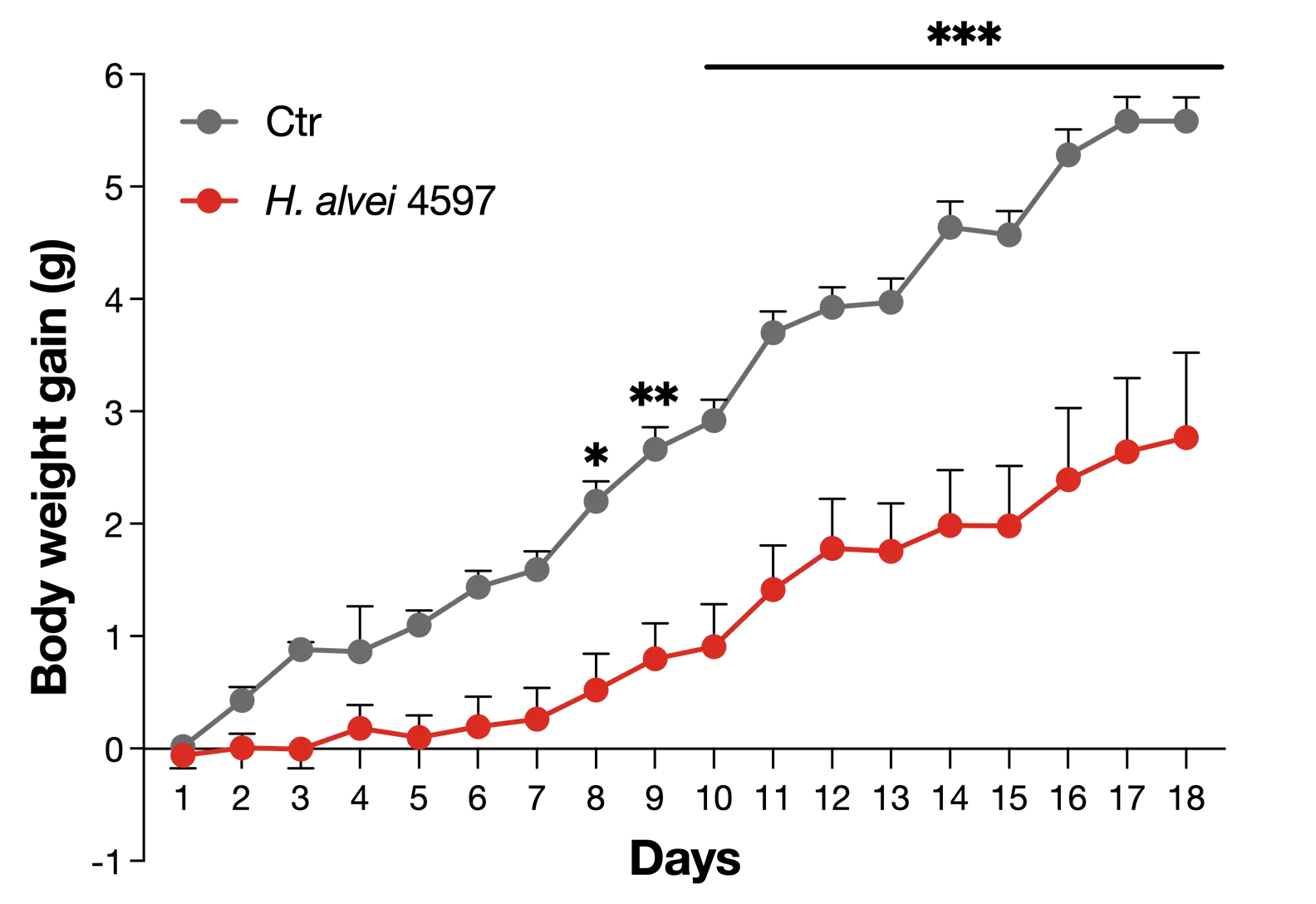
Legrand R. et al. International Journal of
Obesity (2020)
This study also showed Hafnia to significantly reduce body mass gain in both Ob/Ob hyperphagic mice and high-fat diet mice.

Lucas N. et al. Microorganisms (2020)
Hafnia alvei HA4597 significantly reduces overall weight gain in hyperphagic mice on a high-fat diet, and improves glycemia levels compared to the high-fat diet and to the Orlistat group.
2. Clinical evidence: efficacy confirmed through a clinical trial at pharmaceutical standards
Protocol: Randomized, Double-blind, Placebo-controlled, Multicentric Studyl
Supported by pre-clinical results confirming the mechanism of action and showing positive results on weight management, TargEDys performed a 3-months clinical study at pharmaceutical standards on 230 overweight people.
- Hafnia alvei HA4597® (5×1010 cells per capsule) vs. Placebo
- 2 caps per day
- 230 overweight subjects in 2 arms (BMI: 25kg/m2 to 29.9kg/m2)
- Hypo-caloric diet (-20%) for both arms
- 12 weeks of treatment
Main results

BODY WEIGHT LOSS
Significantly more subjects lost at least 3% of baseline body weight at 12 weeks in the treated group compared to the placebo group (HA4597: 57.7% vs. Placebo: 41.7%; p=0.028).
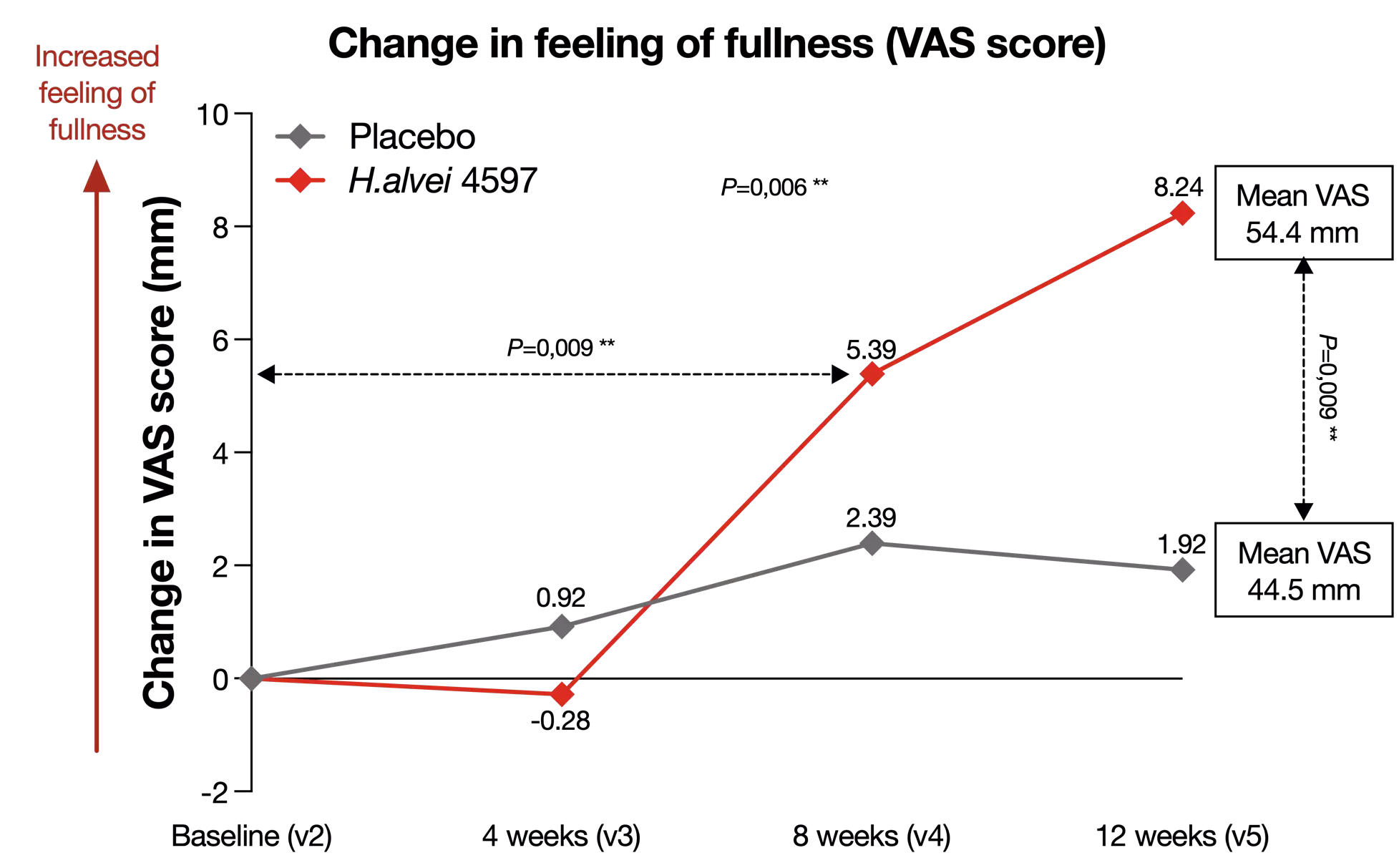
INCREASED FEELING OF FULLNESS
The treated group felt a significant increase in fullness at 8 weeks (p=0.009) and 12 weeks (p=0.006) versus baseline and compared to the placebo group at 12 weeks (p=0.009). The treated group shifted from feeling hungry (<50% fullness) to feeling full during the study despite the hypocaloric diet.
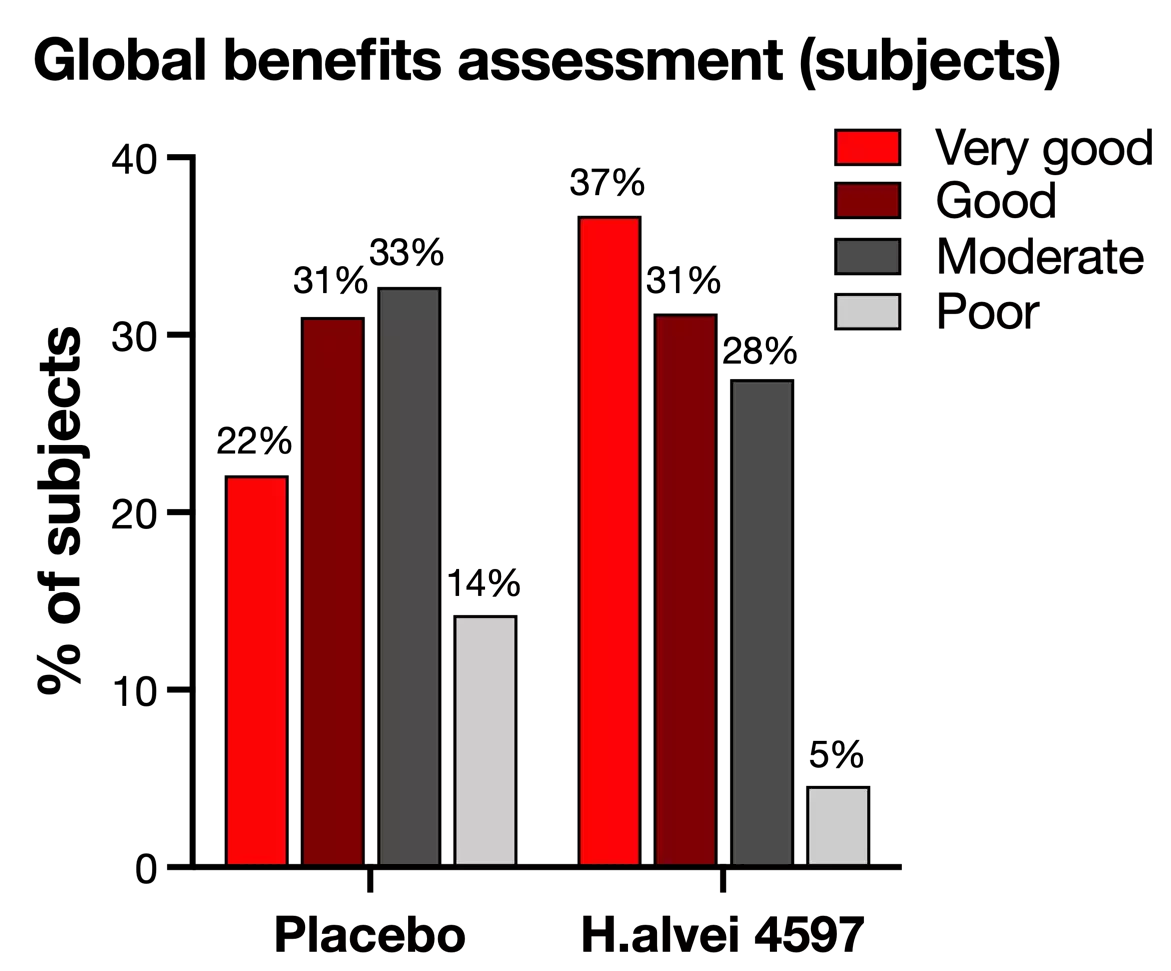
GLOBAL SATISFACTION
The benefit was rated as “very good” or “good” by 68% of subjects in the treated group compared to 53% of subjects in the placebo group (p=0.019).
OTHER RELEVANT RESULTS



Market needs & potential
Overweight and obesity are recognized as the 5th cause of death by the WHO and described as a « global epidemic ». As one of the most global health issues of our century, that unfortunately doesn’t plan to decrease, we at TargEDys are convinced of the potential of PreciBiomic strains Hafnia alvei HA4597® and ClpB to limit this trend.


